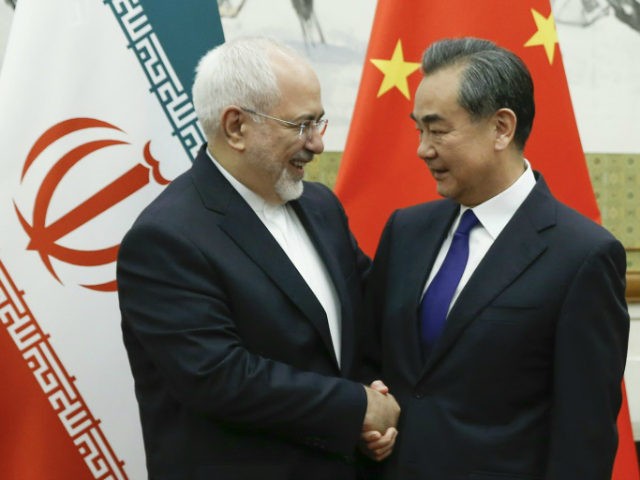China is expected to enhance its activities in the Middle East in response to U.S. President Donald Trump’s decision to annul America’s participation in the Iran nuclear agreement, China’s state-owned Global Times newspaper claimed on Monday.
In late February, U.S. Gen. Joseph Votel, the top American commander in the Middle East, warned lawmakers that China was already seeking to intensify its military posture in the region, noting that the nuclear accord was allowing Beijing to pursue more in-depth cooperation with state sponsor of terrorism Iran.
Citing “experts,” the Global Times confirms the general’s concerns.
“The U.S.’ influence in the Middle East has decreased, and it is losing [the] ability to handle issues in the area. As the U.S. is considered unreliable by more countries, China is expected to play a more important role in Middle East affairs,” Li Weijian, a professor at the Shanghai Institutes for International Studies, told the state-owned news outlet.
“China always insists on peaceful dialogue. China is providing help in the region out of a willingness to promote development, especially in countries that are less developed,” Li said.
In a Beijing-based meeting with Iranian Foreign Minister Mohammad Javad Zarif, China’s State Councilor and Foreign Minister Wang Yi proclaimed that Beijing remains committed to the nuclear accord, echoing the other non-U.S. signatories, which have indicated they intend to keep the pact alive.
Geng Shuang, a spokesperson for Beijing’s’ Foreign Ministry noted on Saturday:
Zarif will visit China, Russia and some European countries, during which he will exchange views with relevant parties on the developments of the Iranian nuclear issue. China is one stop of his visit. China is a contracting party to the Joint Comprehensive Plan of Action [JCPOA] and follows closely the developments of the Iranian nuclear issue. We are willing to maintain communication with Iran and other relevant parties.
Global Times cites Zarif as noting that “Iran attaches great importance to the development of [a] friendship with China and is willing to cooperate with China on the Belt and Road initiative [BRI] in areas such as connectivity and infrastructure construction.”
The United States considers China’s multi-trillion dollar BRI, also known as the One Belt, One Road (OBOR), a national security threat.
Arguing that the United States was unable to affirm whether or not Iran was living up to its commitments under the nuclear deal accord between Tehran and U.S.-led world powers — China, Russia, the U.K., France, and Germany — the Trump administration pulled out of the agreement.
U.S. Secretary of Defense Jim Mattis told lawmakers last week that the Trump administration would continue working with U.S. allies to prevent Iran from obtaining an atomic bomb post-U.S. withdrawal from the agreement, officially known as the Joint Comprehensive Plan of Action (JCPOA).

COMMENTS
Please let us know if you're having issues with commenting.